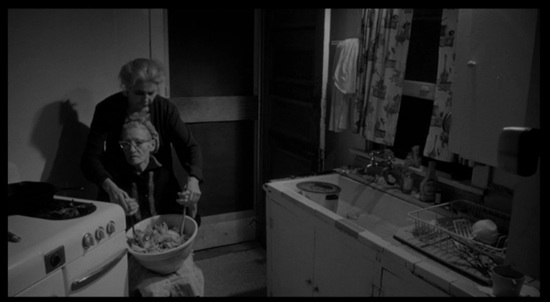Shocking Blocking (5)
By:
October 24, 2010

I first saw David Lynch’s Eraserhead in the early Eighties, at the Harvard Square Theatre. Replete with images of loneliness, tedium, and paranoia, the film portrays Henry (Jack Nance)’s life as pointless at best. At seventeen, I cheered aloud when, for what seemed like an hour, Henry’s elevator door wouldn’t close. Twenty-six years later, though the Eraserhead moment I most cherish may be bleak, it isn’t nihilistic. Mrs. X (Jeanne Bates) plops a bowl of salad into the lap of Grandmother (Jean Lange). She puts Grandmother’s hands through the motions of mixing the ingredients, then puts a cigarette into Grandmother’s mouth and lights it. It’s a moving scene, which is why the unsentimental blocking — the catatonic widow-woman is shunted to the side of the frame, halfway behind the stove — is so effective. Lynch has claimed, cryptically, that a single line from the Bible unlocks the movie’s meaning. Perhaps it’s this one, from Deuteronomy: “And the Levite, because he hath no part nor inheritance with thee, and the stranger, and the fatherless, and the widow, which are within thy gates, shall come, and shall eat and be satisfied.”
An occasional series analyzing some of the author’s favorite moments in the positioning or movement of actors in a movie.
THIRTIES (1934–1943): It Happened One Night (1934) | The Man Who Knew Too Much (1934) | The Guv’nor (1935) | The 39 Steps (1935) | Young and Innocent (1937) | The Lady Vanishes (1938) | Mr. Smith Goes to Washington (1939) | The Big Sleep (1939) | The Little Princess (1939) | Gone With the Wind (1939) | His Girl Friday (1940)
FORTIES (1944–1953): The Diary of a Chambermaid (1946) | The Asphalt Jungle (1950) | The African Queen (1951)
FIFTIES (1954–1963): A Bucket of Blood (1959) | Beach Party (1963)
SIXTIES (1964–1973): For Those Who Think Young (1964) | Thunderball (1965) | Clambake (1967) | Bonnie and Clyde (1967) | Madigan (1968) | Wild in the Streets (1968) | Barbarella (1968) | Harold and Maude (1971) | The Mack (1973) | The Long Goodbye (1973)
SEVENTIES (1974–1983): Les Valseuses (1974) | Eraserhead (1976) | The Bad News Bears (1976) | Breaking Away (1979) | Rock’n’Roll High School (1979) | Escape from Alcatraz (1979) | Apocalypse Now (1979) | Caddyshack (1980) | Stripes (1981) | Blade Runner (1982) | Tender Mercies (1983) | Monty Python’s The Meaning of Life (1983)
EIGHTIES (1984–1993): Repo Man (1984) | Buckaroo Banzai (1984) | Raising Arizona (1987) | RoboCop (1987) | Goodfellas (1990) | Candyman (1992) | Dazed and Confused (1993) |
NINETIES (1994–2003): Pulp Fiction (1994) | The Fifth Element (1997)
OUGHTS (2004–13): Nacho Libre (2006) | District 9 (2009)
READ MORE essays by Joshua Glenn, originally published in: THE BAFFLER | BOSTON GLOBE IDEAS | BRAINIAC | CABINET | FEED | HERMENAUT | HILOBROW | HILOBROW: GENERATIONS | HILOBROW: RADIUM AGE SCIENCE FICTION | HILOBROW: SHOCKING BLOCKING | THE IDLER | IO9 | N+1 | NEW YORK TIMES BOOK REVIEW | SEMIONAUT | SLATE
Joshua Glenn’s books include UNBORED: THE ESSENTIAL FIELD GUIDE TO SERIOUS FUN (with Elizabeth Foy Larsen); and SIGNIFICANT OBJECTS: 100 EXTRAORDINARY STORIES ABOUT ORDINARY THINGS (with Rob Walker).
